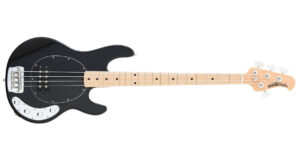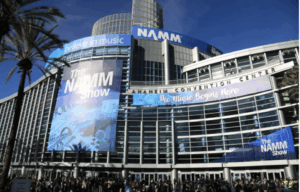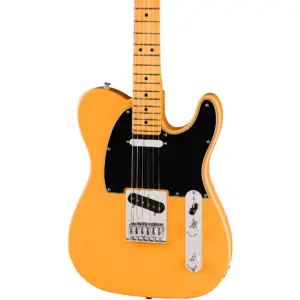Jonita Gandhi spills the tea over a cup of black coffee – Score Short Reads
She’s a live-wire, she’s a triple threat, she’s the full package, we caught up with
the singing sensation Jonita Gandhi this month and here’s our conversation
made up of mirth, modesty, vigour, vision and passion, just like the music
maestro herself.
First things first, you’ve given some amazing hits from ‘Na Na’ to ‘4 AM’ and of course ‘Doctor’ movie in Tamil has released, and your Chellama song is out. What did you love the most?
I loved the fact that despite the pandemic, I could still work remotely, otherwise these amazing songs wouldn’t have seen the light of day. During the pandemic, every industry took quite a big hit and I just felt blessed and excited about the fact that I could continue to create music, and collaborate with people virtually. I even did a song with Merchant Records called ‘Gallaan Teriyan’ which was a collab with Raj Pandit and Salim-Sulaiman. We shot the video for that song completely remotely. I shot my portions in Los Angeles and Raj shot his portions in Mumbai. I’m thrilled that we were able to continue entertaining people with our music when they needed it most.
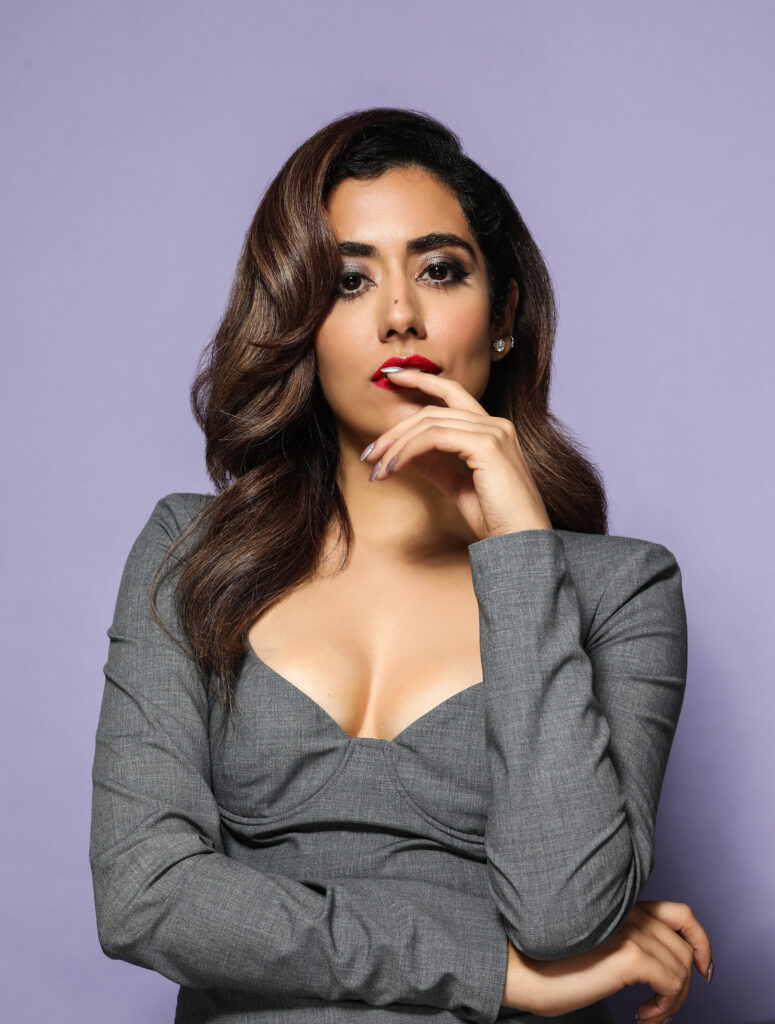
How did the production process of all these tracks happen?
It was a challenge. I remember for the ‘Na Na’ shoot with Mickey Singh, it took place in Los Angeles and during the dance rehearsals I was wearing a mask. It was really scary to be around people and to be on sets during the pandemic, but we ensured that people got tested and we all tried to be as safe as we could be. We did what we could even though the process was elaborate at times – we had a lot more than usual to worry about, like quarantine schedules and things like that.
We probably could have shot the video remotely too but we wanted to make sure we had choreography, and that we had Mickey and I in the same frame. It did require a little extra time because of the COVID restrictions, but it was all worth in the end.
Though recording has always been something that could be done remotely, the pandemic has opened up the general perspective around it and more and more people got comfortable doing recording sessions virtually, especially in the film recording circuit. I’m really glad I was already set up with a proper home recording system to be able to submit studio quality recordings for these tracks.
How important is it for a musician to be classically trained according to you?
I have trained very vaguely and sparsely. I wouldn’t consider myself a trained musician. I’ve done lessons in Hindustani classical, and learnt the basics as well in Western Classical Music. When I went to university, for my elective courses I picked up a bit by taking music courses. I learned art songs, which are kind of like Opera, and a different way for me to exercise my vocal skills.
I think it’s very important to have the training. I don’t think it’s absolutely essential, but it is something that I wish I had more of, especially now that I’ve been in this industry for around eight years and I’ve dabbled in a lot of different genres. A lot of people say that sometimes classical music can restrict how creative you can be in terms of cross-genre collaborations; that it can put you in a box.
I’ve been trying to be versatile, to keep things fresh and to keep learning. And that’s the best way to learn – we have to keep listening to music as much as possible. That being said, if you do have the resources and time to take training, I do recommend it because it’s an asset to have that foundation.
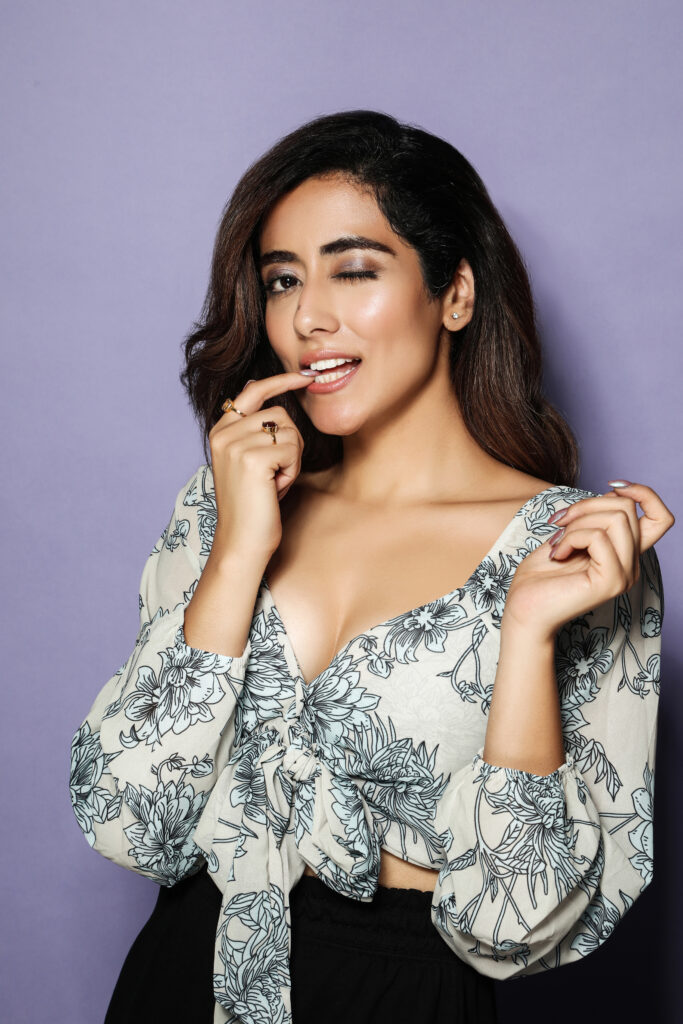
So, we know you have a home band and that your father is also a hobby musician, so could you tell us how did your father introduce you to music and how did this home band come into being?
He has been playing music for his whole life. He played guitar in his college band, and he sang too. Music has played a very important role in his life.
Growing up, my brother and I were exposed to music since we were born. The younger you’re exposed to something, the more ingrained it becomes in your being. I think because of that, I fell in love with music and I think it happened secretly. Initially, I was extremely shy. I would run away when my dad would ask me to sing in front of guests. Eventually, I think because of the perseverance of my parents, I began opening up and I fell in love with singing and performing. From a very young age, I knew that music was going to be a big part of my life.
So you feature in so many music videos, you dance, your LIVE performances are on fire, your style quotient is always on point. All your videos are amazing but which video did you love the most being a part of?
My favourite would be “4 AM”. In general, with Na Na and 4 AM and my most recent single “Chal Koi Na”, there’s a very conscious effort being made to showcase myself in a way I have always wanted to. I was always focused on being a singer first, but I feel that in these recent videos, I’ve started to showcase my artistry in a more well rounded way and perform more. These last videos have been extra fun for me because I enjoy dancing. For 4 AM, we put in a lot of time and effort into nailing the choreography. Even the styling was a great fit for me personally.
You’ve sung in Tamil, Telugu, Hindi, Marathi, Gujarati, Kannada and Punjabi. How do you manage the diction, the pronunciations despite growing up in Canada? Could you share some pro-tips for aspiring singers?
The thing is, for diction, ear training is very important. This training comes in handy, so for anybody who is starting, pay attention to ear training. When I learned Western Classical, we did ear training specifically. We had to identify chords and notes with a chord. Things like that help you develop a sharper ear. That’s your best bet when it comes to diction; you have to rely on listening and mimicking sounds. We can’t know all of the languages we sing in, so it’s a challenge; but a really fun challenge, because I connect with the melody and the arrangement, more than just the lyrics.
When I’m recording, I write down the translations for the lyrics, especially keywords if I need to know the meaning for specific words. I note the pronunciations to distinguish between the soft sounds and the hard sounds. The biggest piece of advice is to make sure somebody who is a native speaker of that language is present while you are recording and just leave your ego out the door and surrender to them. If they tell you it’s wrong, it’s wrong.
In an earlier interview, you’d spoken about how Bollywood songs have way more lyrics for the man as opposed to the woman. We would like to hear a little more about it. Do you think any changes have taken place?
I do think some changes are happening. The issue I think was primarily because there were more films were male-centric, so that would lead to the songs being more male-centric as well since the songs cater to the film. Now, as non-film songs are becoming more prominent in the Indian music scene, I think that’s a great opportunity for more female-heavy songs to come to light. I am trying to take advantage of that too and put out more music that doesn’t rely on an actor to push it.
Over the last few years, we’ve seen a lot of remakes of yester-year hits, how challenging is it for today’s singers to do justice to these songs and yet deliver a fresh version?
As somebody who does covers all the time, this is an interesting question. I just consider it as a fun challenge, to present a song that you know and love, that everybody also knows and loves, in a way that stays true to the original composition but also showcases your personality and creativity. It’s a very delicate balance that you need to achieve. Covers for me are always like a tribute, it’s challenging but with remakes the labels are doing now I don’t know if people care that much about staying true to the original, they just want to dance.
With remakes in general, I’ve never really been happy with the concept in film, mainly because Bollywood as a platform is so far-reaching. I’ve always felt there is so much great original music getting displaced.
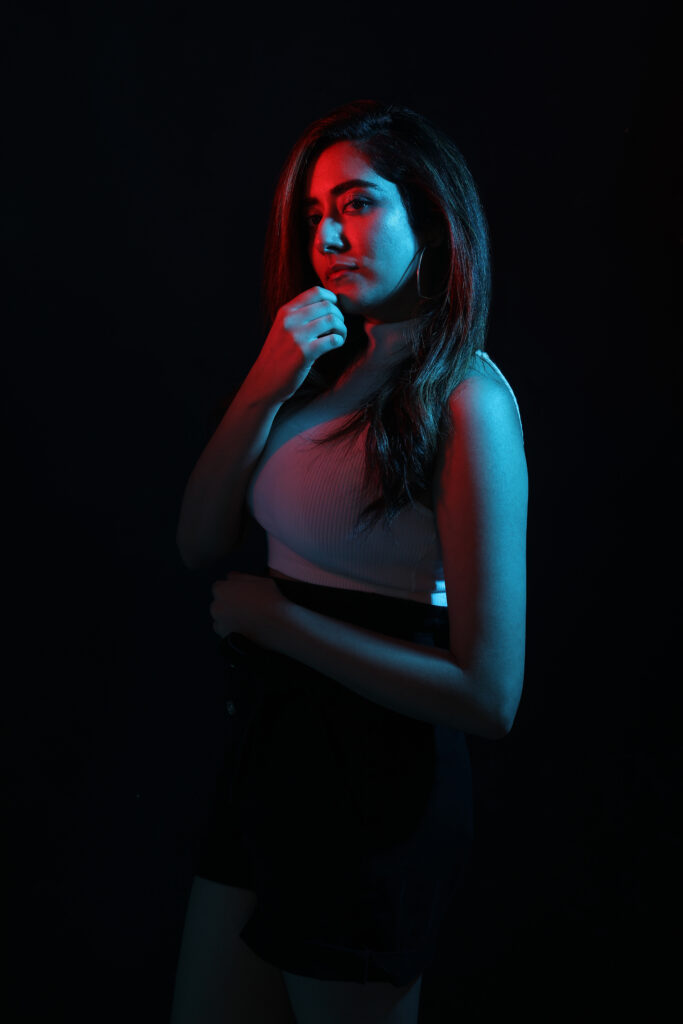
What do you think about the digitalisation of music, about the marketing aspect of music?
It’s overwhelming to be honest. For that reason, I try my best to keep myself focused on creating music rather than promoting it. Of course, when it comes to social media, I am very involved. I’m always striving to think of creative ways to introduce people to my music.
But it’s a numbers game and quite frankly a money game, so it’s very intimidating. When YouTube was new, things used to go viral organically. Now it’s so hard to gauge what viral means. Repetition works though; the more you hear something, the more it catches on. It’s impossible to keep track realistically of how well a song is actually doing, though I think streaming numbers are a more reliable way to figure it out of all the metrics.
Now, let’s talk about Jonita as a listener, what according to you makes a good song? What do you like to listen to?
There’s a lot that makes a song good, but honesty is extremely important. I am someone who listens to anything and everything and sings anything and everything. It’s as simple as do I feel it or not. It could be a very simple production of just a few layers but someone put their heart out there, or someone’s playing the violin and poured their heart into the song and I’ll love it. On the other hand, it could be a very well-orchestrated symphony piece but if it didn’t strike a chord with me, I may not like it. That’s the beauty and the curse of music: that it is so subjective.
What’s super interesting that people don’t know about your music?
I think there’s a lot! For instance, a lot of people wouldn’t know that I’ve been writing a lot of English ballads. Many don’t know that I’m Punjabi. They think I’m Gujarati but I’m not. A lot of people think I speak Tamil, so they’re confused right now, but that’s the part of the journey. There’s always so much to discover about me if you’re a follower, which I hope is keeping it interesting and not confusing.
Another thing that many might not know is that I am always struggling with an identity crisis when it comes to my music.
Why would you say that?
Because like you said, I do so many different things, and sing in so many different genres and languages.
But that means you’re versatile, right?
Yeah. Many people say when it comes to ‘Jonita’s music’ what does it sound like? I am zeroing in a little more on a specific sound so that people can identify me with it. I am going to try to use my versatility as a strength for sure, I just want to bring it all together. I want my music to appeal to all my people. All my musical family are true music lovers. For instance, my North Indian following loved Chellamma. I want to bring it out as ‘Jonita’s music’ and not as ‘Jonita sang for XYZ’.
How do you manage your vocal health?
Drink lots of black coffee! Haha, I am kidding. Drink lots of water, for sure. In general keep your whole body fit and healthy. Your voice is a part of your body. Sleep properly. Be happy. I know it sounds silly but the mood does affect your vocal performance. Just look at it holistically, and you should be just fine. People say don’t eat this and that, but my take on that is don’t cut anything out because it’s like building immunity. Plus, lots of Riyaz! Practice, and practice a lot.
What’s that one thing you do before a recording session or getting on stage? Is there a regime that you follow?
Haha, don’t follow what I do because I drink black coffee! It’s like a comfort thing; something warm generally feels nice so I always restrict myself to one, then I switch to warm water.
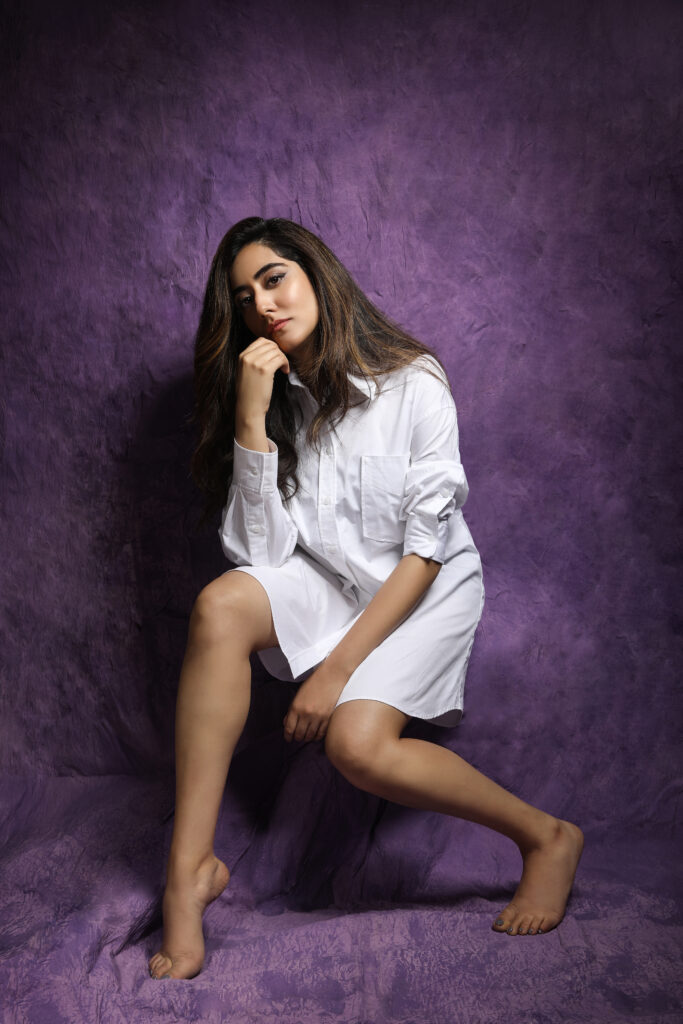
Can you just tell us what we can look forward to in terms of music?
I have a lot of exciting new things happening, including some new music I am rebranding myself with that I can’t wait to share! Other than that, I have some YouTube collaborations and film songs in the works as well. Stay tuned to find out more!
Are we going to see more Jonita dancing?
Yes! I always look forward to dancing. Ever since I did a couple videos on YouTube and Instagram, the response made me realize that I need to dance in my music videos. Whether it’s a romantic song, or a rona-dhona song, you’ll find me dancing on the sides…. haha.
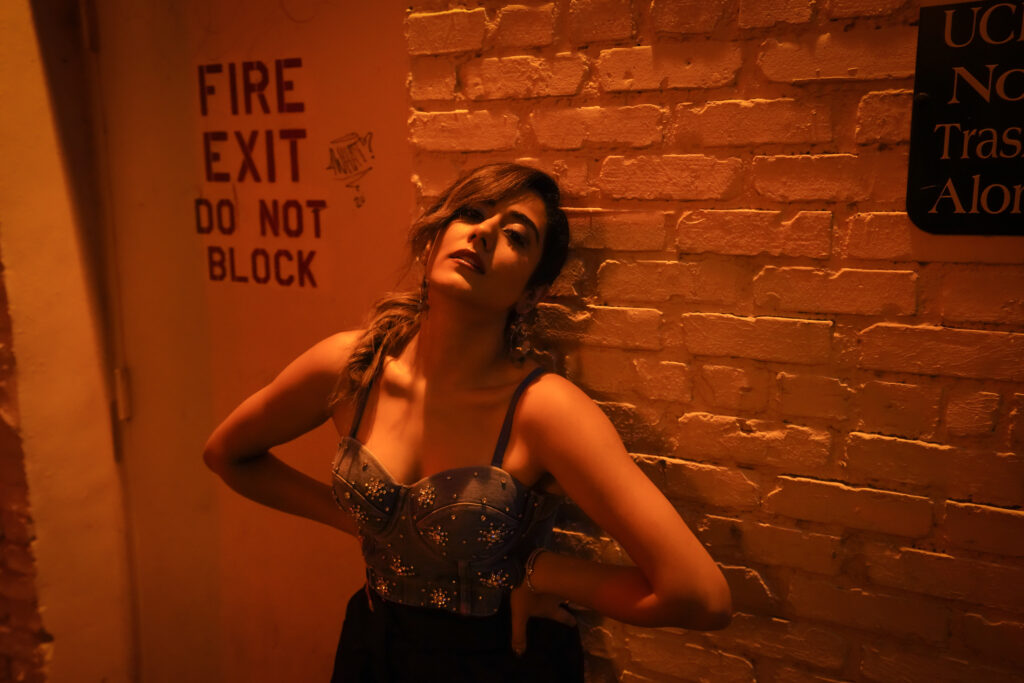
Rapid Fire
A musician you’re dying to collaborate with?
Bruno Mars, that was fast I knew that one.
One actress, you would love to playback for that you haven’t yet.
Sanya Malhotra, I think she’s adorable and she dances well.
Your favourite 90s/vintage song/album?
Dil Se
Looking back at your journey so far, what was one of your pinch-me-I’m-famous moments?
My pinch-me-I’m-famous moment was when I saw myself on a billboard at Times Square. And also, right before that, I was on a billboard in Toronto and I was my with parents. That was an even bigger moment for me, I think.
A song that’s super cringy but you just can’t get out of your head!
The scary thing is that I had a song in my mind instantly! Haha, no, I’m not saying it, haha!
One folk song you would love to revive.
My grandma sings this one all the time “Lathe Di Chaadar”. It’ll be cool to do this one!
What was the last thing you googled?
I googled what 4 million rupees are in dollars. That’s the last thing I googled.
If you were a food item, what would you be?
I would be a chatpata samosa! Haha.
Do Follow
Instagram – https://www.instagram.com/jonitamusic/?hl=en




